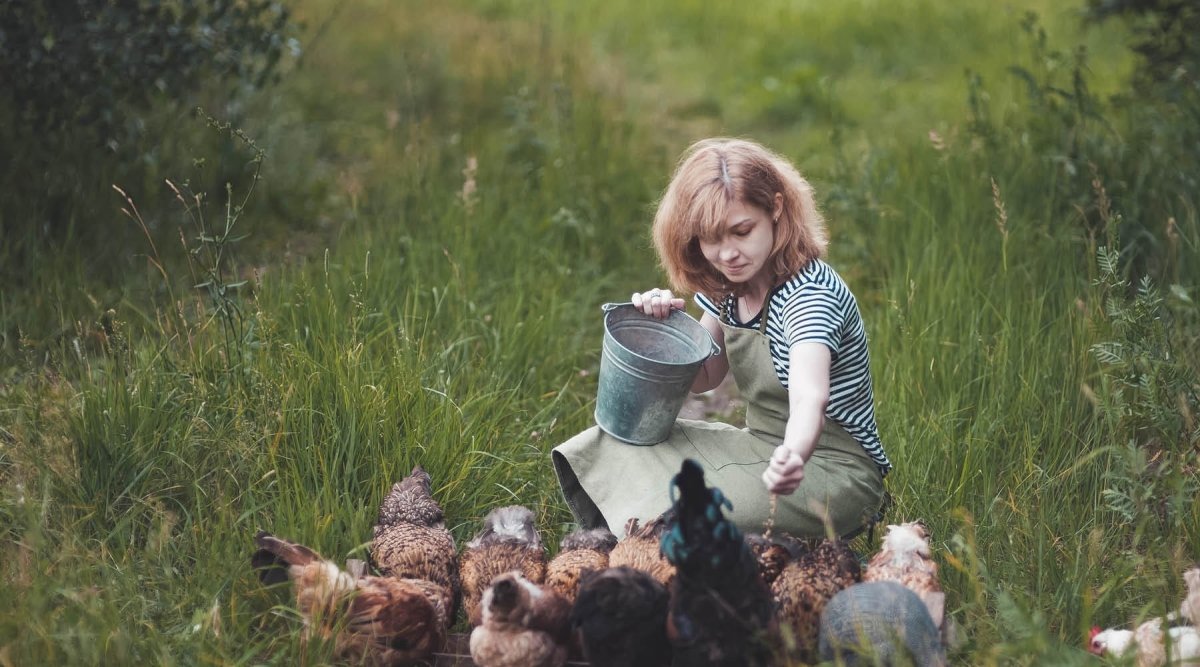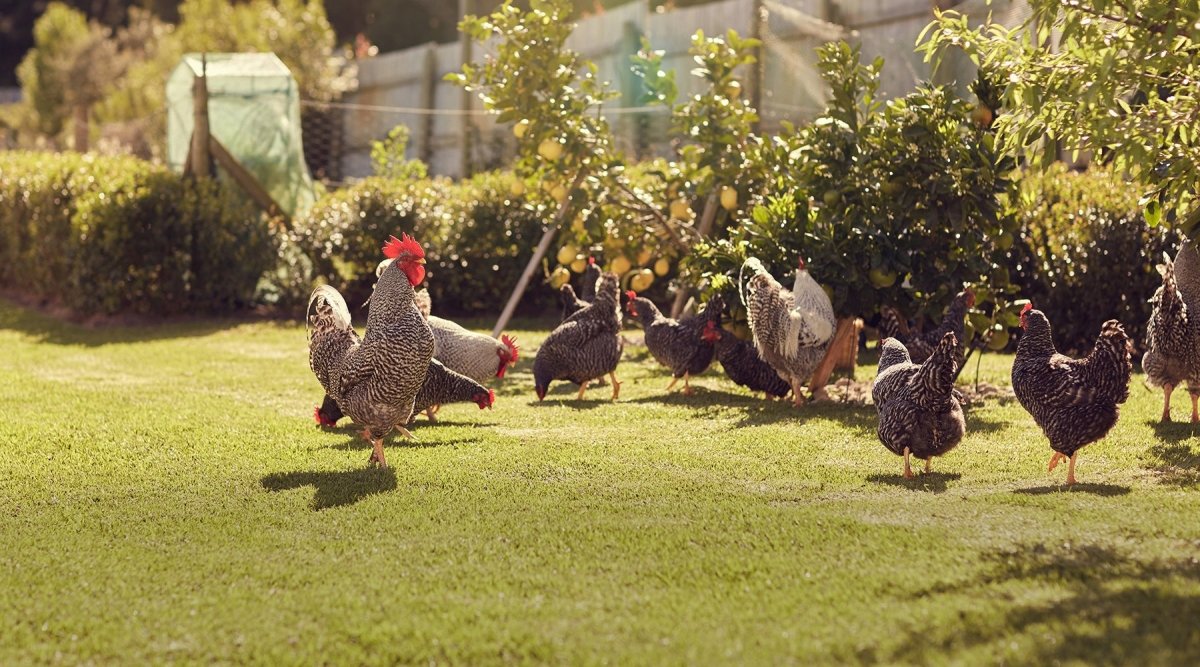Like all other living creatures, feathered bipeds also need regular food. The advantage of chickens, however, is that they are omnivores. But what exactly does that mean and how much food is enough for the animals? We answer these and other questions about feeding chickens correctly in this article.
Chickens' digestive system
Feeding chickens correctly is a source of uncertainty, especially for many beginners. The amount of feed, the composition of the feed and the frequency of feeding give rise to many questions. In order to understand the animals and their feeding behavior, it can help to take a look at the digestive process.
Chickens eat differently to other pets and farm animals, and the digestive process is also different in poultry. They pick their food from the ground or from the feeding trough and, unlike dogs, horses or goats, they have no teeth to grind the food.
Chickens and many other bird species ingest the food and mix it with saliva in their oral cavity. The food then passes through the oesophagus into the crop, a pouch-shaped extension of the oesophagus. This is where the stored food is temporarily stored and pre-swollen.
Finally, the food is passed on to the stomach, which is both a digestive and excretory organ. The chickens' stomach takes over the main task and grinds the ingested food.
The chicken stomach is a hollow organ made of muscle tissue and is divided into two cavities: the glandular stomach and the gizzard. The enzymes pepsin, chymosin and hydrochloric acid are produced in the glandular stomach. They create an acidic environment and serve to break down the food. The gizzard, which is equipped with strong muscles, is located directly next to the glandular stomach. It has a similar function to teeth and grinds the food. The muscles exert such enormous pressure that hard food grains are crushed. The gizzard also receives help from pecked stones, which act as a mortar and crush the food. These stomach stones are also called gastroliths or grit.
The food pulp then reaches the small intestine, where it is digested and the food is broken down and utilized. The unutilized food is excreted. There is also a special feature in excretion: chickens excrete feces and urine at the same time, as they only have one excretory organ for this.
What do you feed chickens?

Simply picking up food in the open air is not enough for the animals. You should always provide a high-quality and balanced chicken feed for the animals. Chickens should have access to food and, of course, fresh water all day long. This is because they cannot build up food reserves and cannot really store nutrients in their bodies for long. They therefore scratch and peck for food almost all day long.
The chicken feed should have a balanced and varied composition:
- Grains: wheat, maize, barley, oats and rye, sprouted grain
- Soft feed: potatoes, potato peelings, cooked pasta or cooked rice
- Green fodder: grass, clover, alfalfa, nettle, herbs, salad leaves, meadow cuttings
- Fruit & vegetables: windfall fruit such as apples, pears or cherries, watermelons, cucumbers, sliced carrots, zucchinis
- Worms and insects
- Kitchen waste: In pieces suitable for chickens, kitchen waste such as pasta, boiled potatoes and the like are a tasty feast for the animals.
Nature provides the animals with seeds, green food, small insects, worms and berries. Chicken feed in the enclosure or free range should also contain these food components. In this way, your feathered friends will receive all the important nutrients and you will prevent deficiency symptoms and nutrition-related diseases.
Don't forget to clean your chickens' feed bowls and drinkers regularly. Also remove leftover feed in good time to prevent germs and bacteria from forming. Especially in the warmer months, leftover feed, dirty bowls and drinkers can pose a health risk to the animals. Thorough daily cleaning can save you a lot of trouble.
Calcium for chickens - ensuring their supply
If you want to feed your chickens properly, you must not forget an extra supply of calcium. The mineral is a must in chicken feed. The animals need calcium primarily for egg production, but their bones, joints, feathers and beaks are also dependent on the nutrient.
If chickens consume too little calcium in the long term, it can be very dangerous for the animals. The strength and density of the eggshells decreases, to the point that the animals no longer lay eggs. Eventually, the body's low calcium stores, as well as bones and feathers, are affected. This nutrient deficiency can lead to deformation of the hens' legs and loss of feathers.
Calcium is usually provided to the animals in the form of shell limestone or shell grit for chickens. It is particularly rich in minerals and consists of calcium deposits from different layers of rock. You should provide your chickens with additional calcium-rich feed supplements, especially for laying hens and during the moulting period.
How much feed does a chicken need?
The amount of feed depends on both the breed and the way they are kept. If chickens are only kept indoors, they need more feed. In free-range systems, on the other hand, the animals also have the opportunity to peck for food. The size of the animals also plays a role: bantams naturally need less nutrients than a Jersey Giant chicken.
As a general rule, you can say that chickens need approx. 120 g of balanced complete feed per day. However, you should go individually by breed and of course not ignore the husbandry of your animals.
If you are unsure about the right feed for your chickens, you can ask your specialist retailer or contact our animal experts. They can help you to put together the right feed for your animals. Our animal nutritionists and veterinary practitioners are also the right people to contact when it comes to keeping chickens in the garden.
What shouldn't you feed chickens?
You can make chickens happy with almost any feed, but not all feed is good and healthy for the animals. Despite their title of omnivores, you should not feed the following foods to chickens:
- Spicy foods, especially those with pepper, salt or chili, should not be fed.
- Be careful with mandarins, oranges and the like: citrus fruits contain a lot of vitamin C and can lead to intestinal bleeding if they are over-supplied.
- Avocados are poisonous to many animals, including chickens
- Animal protein is prohibited by law: To protect the animals from disease, but also to prevent cannibalism, you should not feed your chickens meat.
- Food scraps that are too large: If fruit or vegetables are cut too roughly, they can cause crop blockages in the animals.
- Tomatoes only in moderation: These shade vegetables should also only be fed in limited quantities, otherwise poisoning symptoms may occur.
Conclusion
Feeding chickens properly is easier than you might initially think. The animals are just as happy with kitchen scraps as they are with freshly plucked herbs. When feeding them correctly, make sure not only that the feed is varied, but also that they have access to feed throughout the day and a constant supply of drinking water. The animals eat well into the evening, which is also a good activity for them.




